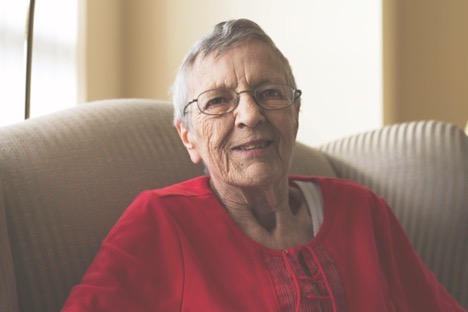According to the Mayo Clinic, early-onset Alzheimer’s is an uncommon form of dementia that strikes people younger than age 65, well before they may be ageing in place or in receipt of any aged care services. Of all the people who have Alzheimer’s disease, about 5 percent develop symptoms before the age of 65. Most people with early-onset Alzheimer’s will develop symptoms in their 40s and 50s.
Oftentimes it is hard to make a diagnosis of early-onset Alzheimer’s because many health care providers or family members believe something else must be causing the symptoms. An accurate diagnosis of early-onset Alzheimer’s is crucial for ruling out other potential issues and getting the most appropriate treatment.
Read: What We Know About The Causes of Early-Onset Dementia
How to Identify the Signs of Early-Onset Alzheimer’s Disease

The symptoms of early-onset Alzheimer’s disease are similar to many of the symptoms with later onset Alzheimer’s. This ranges from personality changes to low energy, memory issues, mood swings, attention problems, and difficulty in finding the right words to say. One common distinction between the early and late-onset types is that early-onset Alzheimer’s patients tend to develop memory problems later in the progression of the disease. The memory loss may also be less severe.Here are eleven signs and symptoms that may occur in people with early-onset Alzheimer’s disease well before they are ageing in place or in need of care in the home:
- Difficulty remembering things. Your parent or loved one might become more forgetful than before, or ask the same question over and over without realising it. While some forgetfulness might be normal, an increase in memory lapses might indicate a problem you shouldn’t neglect.Helpful hint: If you feel like you are constantly stepping in to remind your parent about things, remember to make an appointment with a healthcare professional.
- Diminished planning and problem solving ability.
.Early stages might be characterised by a declining ability to plan activities or solve problems. This can be everyday things like remembering to pay a bill.Helpful hint: Should you suspect something has changed, look over your loved one’s shoulder on their bills, or financials. Poor financial planning can have disastrous results when it’s not caught and corrected in time, and impact the options for aged care services or in home care services down the track. - Trouble finishing familiar activities. Dementia affects people in different ways. When your loved one forgets how to make a favourite recipe, or develops problems following directions for a new recipe, it might reveal a change in mental function. Sometimes, this shows up as difficulties with routine workactivities or simple household chores. Helpful hint: When a relative is struggling with things they once handled with ease, step in and offer help. Observe the situation and if something seems amiss, call on the services of a dementia specialist.
- Losing track of time. While we all have days where we don’t know where the time has gone, chronic issues with neglecting appointments or forgetting what day it is are indications of possible memory issues. Helpful hint: When you suspect dementia, time is not on your side. Don’t wait to seek professional medical help.
- Vision problems. This may run the gamut from eyesight problems to visual processing issues such as difficulty judging distances or reading comprehension. Helpful hint: Keep watch on the situation. Make sure their glasses or contact lense prescription is up to date. If an eye exam checks out and the problems persist, have your loved one evaluated to rule out dementia.
- Becoming withdrawn. You may notice your loved one become disinterested in life. This might be a symptom that Alzheimer’s has developed. Be sure to show extra interest in your relative’s activities and welfare. Helpful hint: If their lack of interest continues or worsens, don’t hesitate to make a doctor’s appointment.
- Personality changes or increased moodiness. Alzheimer’s disease is about more than memory loss. Symptoms of early-onset can also include personality changes ranging from subtle to drastic. Plus, if your relative appears to be moodier than they once were, don’t automatically chock it up to their being “old and cranky.” Helpful hint: It’s better for your parent to visit their doctor and find out it’s not dementia, than to neglect their symptoms and have the disease progress untreated, only to be revealed while they are ageing in place, and requiring care in the home or aged care services.
- Poor judgment. Sometimes a bad decision is just, well, a bad decision. Other times it might indicate the early stages of Alzheimer’s. Helpful hint: When your mother or father makes repeated errors in judgment, seek medical help as soon as you can.
- Physical challenges. We all want to believe that declines in physical abilities are a normal part of ageing. However, trouble walking, speaking or swallowing could be related to dementia. Helpful hint: Keep your parent safe and be as supportive as possible. Then schedule a checkup with their doctor.
- “Where did I put that?” When misplacing items becomes a habit, or should your parent ever get lost, it might be early-onset Alzheimer’s. Helpful hint: When your loved one forgets where they put something, it’s frustrating. When they are out in the world and forget where they are, it’s scary and potentially dangerous. Please take these symptoms seriously and schedule an evaluation right away.
- Hard to find the right word or using the wrong word. Dementia can affect one’s ability to communicate effectively. Helpful hint: If and when someone you love struggles to express themselves clearly, show your love for them by making an appointment with their physician.
Supporting someone with Early-Onset Alzheimer’s.

The first step in offering support to a relative with Early-Onset Alzheimer’s is to get an accurate diagnosis as early as possible. A proper diagnosis will help your loved one in numerous ways. Firstly, it can rule out other possible causes. Just as important, the diagnosis paves the way for the right sort of treatment. In addition, the diagnosis enables you and other family members to provide the right kind of compassion and support. Plus, the earlier the diagnosis is reached, the more time you will have toaddress not only health-related issues, but legal, financial and personal ones as well before they are in need for in home care services or aged care services.
If your loved one is still in the workplace, you can help them cope with how they will handle their job. People dealing with early-onset Alzheimer’s may also have to cope with the judgments of their employer as well as their co-workers. They may need to switch jobs or face the prospect of an early retirement –and may need to learn how to live with fewer financial resources as they start ageing in place sooner than expected. It can help to become familiar with your relative’s superannuation benefits, leave entitlements or government support. You may also need to think beyond the needs of your loved one. For example, their spouse or partner’s life might transition to a caretaking role.
10 Ways to Slow the Progression of Early-Onset Alzheimer’s

Although there is no currently known cure for Alzheimer’s, there is still much you can do if you or a loved one are diagnosed at an early age. According to Dr. Gad Marshall, Associate Medical Director of Clinical Trials at the Center for Alzheimer Research and Treatment at Harvard-affiliated Brigham and Women’s Hospital, healthy habits may help ward off Alzheimer’s. There are several actions anyone can take to slow its progression while improving quality of life prior to the need for in home care services or aged care services.
In addition to Dr. Marshall’s sensible advice, there is a range of other things you can do to prevent cognitive decline – personally, socially, and medically. An encouraging study by the UCLA Mary S. Easton Center for Alzheimer’s Disease Research and the Buck Institute for Research on Ageing has suggested that memory loss in patients may be reversed, and improvements may be sustained. The study used a complex program involving changes in diet, brain stimulation, exercise, optimisation of sleep, specific pharmaceuticals and vitamins, and additional efforts that affect brain chemistry. Try incorporating these findings into your life by trying these strategies:
1. Get regular exercise.

Getting regular physical exercise may help prevent the development of Alzheimer’s or slow its progression in people who have symptoms. Many doctors recommend 30 minutes of moderately vigorous aerobic exercise, three to four days per week.
2. Eat a Mediterranean diet.

A recent study showed that full or even partial adherence to the Mediterranean diet can help to promote brain health. The Mediterranean diet includes fresh vegetables and fruits, whole grains, olive oil, nuts, legumes and fish. You can also eat moderate amounts of poultry, eggs, and dairy, and drink moderate amounts of red wine. Red meat should be eaten only sparingly. Home Care Assistance Care Workers are trained in these nutritional principles to support those ageing in place in home care service.
3. Get enough sleep.

Growing evidence suggests that getting enough sleep is linked to greater amyloid clearance from the brain. One of the characteristics of Alzheimer’s is the accumulation of amyloid plaques between nerve cells in the brain. In other words, the link between Alzheimer’s disease and lack of sleep is strong. Dr. Marshall recommends seven to eight hours of sleep per night. Try having a regular sleep schedule, reading a book to unwind or avoiding caffeine before bed.
4. Stay involved socially.

The importance of socialisation prior to, and whilst ageing in place is significant. Remaining engaged with friends, family, and business colleagues may lessen the burden which naturally accompanies the beginning phases of Alzheimer’s. To increase and maintain a sense of connection, focus on things and people that uplift you and encourage a sense of purpose. You can also grow a network of support outside of your inner circle of friendships. Reach out to your community, spread your wings and develop unexpected relationships.
5. Take charge.
When your head is reeling with an early-onset diagnosis, there’s a tendency to think, “it’s over…nothing really matters.” But that is far from the truth. There is a lot you can do to potentially slow down the progression of the disease and the need for in home care services or having to google an aged care facility near me. There will be a time when you need to lean heavily on the help of others. But right now – today – if you are at the beginning of younger-onset Alzheimer’s, you might be surprised by what you can do.
6. Explore pharmaceutical approaches.

At this time, no medications are available that can reverse or cure early-onset Alzheimer’s. However, some patients find prescription medications can tamp down the symptoms. There’s no guarantee these medications will work, but some people with Alzheimer’s get symptomatic relief that lasts for years, and in home care services can provide a good support for medication reminders and adherence to schedules.
7. Join a support group.
Once you’re sure it’s early-onset Alzheimer’s and not something else, support groups can be helpful for patients as well as family to meet others facing the disease and compare notes with other people who share your early-onset diagnosis.
8. Consider a clinical trial.
Since patients with early-onset can live with the disease for a long time, it might make sense to explore the option of entering a clinical trial. According to the Alzheimer’s Association, funding is not the biggest challenge for clinical researchers. Instead, finding trial participants is!
9. Adjust the way you work.

People who are still in the workplace may explore how a work schedule can be adjusted to accommodate the condition. If the condition is more advanced, consider counseling that paves the way to early retirement and support you ageing in place with Alzheimer’s..
10. Additional alternatives.
Some approaches that are not related to Alzheimer’s disease show progress in helping to slow down early-onset Alzheimer’s. This includes treatments for cardiovascular health and diabetes, antioxidant therapy, and cognitive learning programs. As Alzheimer’s research accelerates, new insights are coming to light all the time.
Financial Planning after an Early-Onset Alzheimer’s Diagnosis

When you or a loved one’s world is rocked from an early-onset Alzheimer’s diagnosis, it’s normal to feel sad, angry and paralysed with fear. Things like financial planning typically get shoved to the back burner because they’re simply too painful to think about.
As challenging as it is, the reality is that an Alzheimer’s diagnosis comes with a high price tag. Plus, it’s better to begin planning while your loved one with a diagnosis is in an early stage and more likely to be able to participate in the decision-making process.
So, where to start? One obvious place to begin is with a family’s source of income. People with early-onset Alzheimer’s are often forced to modify their employment availability and as a result, they may even lose their job. How can families cope with income loss? Covering living expenses as well as the price of medical treatment can cause a strain on the family budget. Following a heart-to-heart conversation with loved ones, many families choose to seek advice from a financial advisor.
You’ll want to organise, review important documents, and create a realistic budget. Explore options for government support along with insurance options, and consider if any low-cost or free community services are available. In addition to a financial advisor, you may want to seek legal advice from a lawyer who specialises in elder law. They can help you deal with matters like estate planning and key legal documents.
Until a cure for early-onset Alzheimer’s is found, it’s a great idea to do what we can to slow down the progression. Do what you can to exercise regularly, eat a healthy diet, and get enough sleep. Try exploring medical options, support groups, and alternative treatments. While these aren’t proven to prevent or slow the disease, they are all great ways to promote overall brain health.
On top of offering emotional support and guidance, you may need to seek the advice of an accountant or financial planner to explore the options. And if you feel like you need some good news, remember that you are not alone. You will need to roll up your sleeves (and possibly dry your eyes), but you may well discover resources you had no idea existed.
Resources
https://www.alz.org/alzheimers-dementia/what-is-alzheimers/younger-early-onset
Mayo Clinic: Early-onset Alzheimer’s
What You Can do to Avoid Alzheimer’s Disease
Memory Loss Associated with Alzheimer’s Reversed for First Time
Living with Younger Onset Alzheimer’s
If You Have Younger Onset Alzheimer’s Disease
Money Matters: Making a Financial Plan After a Diagnosis of Dementia
What are the signs of early onset Alzheimer’s Disease (AD)?
As a leading age care provider, Home Care Assistance offers tailored in-home care services for older Australians, enabling them to live happier and healthier lives in the comfort of their own homes.
We offer private and government subsidised Care Packages and have office locations that are a registered NDIS provider. Our Care Workers undergo extensive training in order to deliver unmatched in-home aged care services where people can continue ageing in place. We are proud ambassadors of the My Aged Care government funded aged care program, enabling Australians to successfully navigate the process and gain approval for in-home care support packages. Home Care Assistance offers hourly care, specialised care, Alzheimer’s and Dementia care, hospital to home care, and 24 hour in home care.













